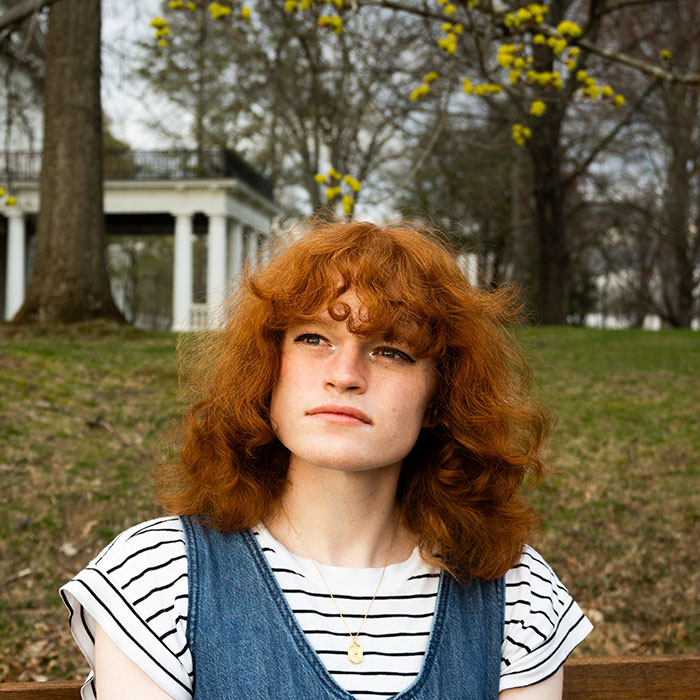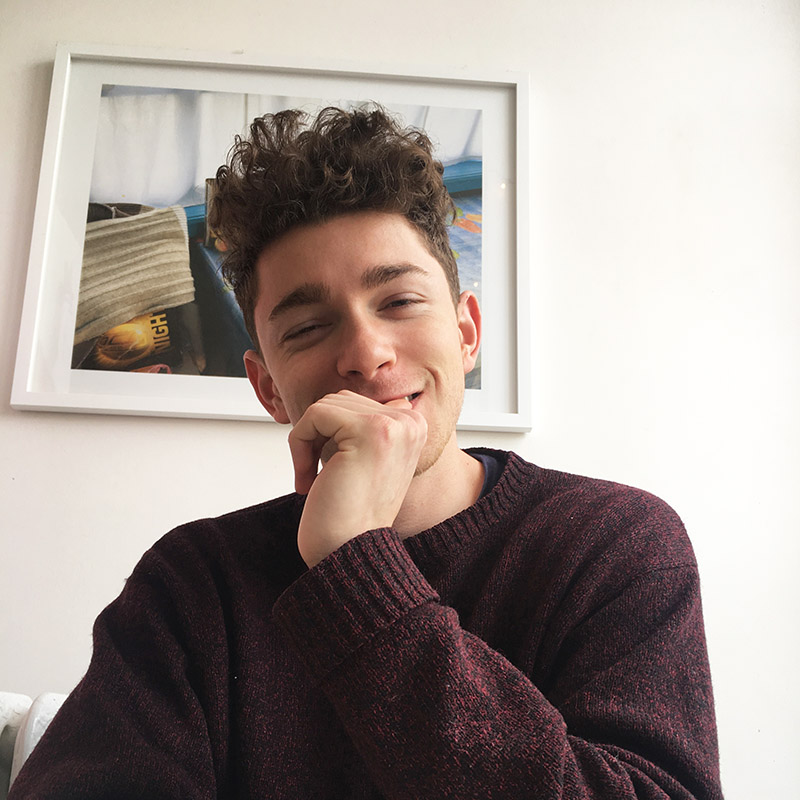The Written Arts Program encourages students to experiment with their own writing in a context sensitive to intellectual, historical, and social realities, and the past and current literary landscapes. Students are encouraged to consider how their writing is and can be an act of critical and creative engagement, a way of interrogating and translating the world around us. It is expected that Written Arts students are also passionate readers.
Why I Chose Bard Written Arts
-
 Samantha BarrettGrowing up in Palo Alto, California, Samantha Barrett knew she wanted to attend a small liberal arts college. As a Written Arts major at Bard, Samantha values the College’s cross-disciplinary approach to learning. “Writing is a practice that benefits from having a wide view or scope," says Samantha.
Samantha BarrettGrowing up in Palo Alto, California, Samantha Barrett knew she wanted to attend a small liberal arts college. As a Written Arts major at Bard, Samantha values the College’s cross-disciplinary approach to learning. “Writing is a practice that benefits from having a wide view or scope," says Samantha.Samantha Barrett

Growing up in Palo Alto, California, Samantha Barrett knew she wanted to attend a small liberal arts college. As a Written Arts major at Bard, Samantha values the College’s cross-disciplinary approach to learning. “Writing is a practice that benefits from having a wide view or scope," says Samantha.
Growing up in Palo Alto, California, Samantha Barrett knew she wanted to attend a small liberal arts college. As someone who has always been curious and driven, she tends to thrive in smaller educational environments, where she can forge meaningful connections with professors. Samantha was admitted through the Bard Entrance Exam—a nontraditional application process that engages motivated students in an essay writing test which closely mirrors actual college coursework. “It was a good sign for what this institution would be,” she says. “Having that opportunity to prove myself outside of a rigid, standardized structure was nice.”
As a Written Arts major at Bard, Samantha values the College’s cross-disciplinary approach to learning. In addition to studying with her writing professors, including Benjamin Hale, Jenny Offil, and Dinaw Mengestu, she cites other classes like “The Rift and the Nile,” an anthropology course on East Africa taught by John Ryle, and a tutorial with Nabanjan Maitra, a professor in the Interdisciplinary Study of Religions, on post-WWII social theorists as influential. “Writing is a practice that benefits from having a wide view or scope. Taking classes in other academic disciplines has strengthened my writing. I’m trying to keep an open mind and indulge my curiosity while I have that chance,” she says. “Having broad interests is essential to being a good writer or artist in any form.”
Samantha’s short story “Invert” won the 2025 PEN/Robert J. Dau Short Story Prize for Emerging Writers, which comes with a $2,000 cash prize and publication by Catapult in their annual anthology, Best Debut Short Stories: The PEN America Dau Prize. “I sent that piece on a whim, not expecting it to go anywhere,” she says of her story, which was published by San-Francisco–based literary magazine Foglifter Journal, whose editors nominated the story for the PEN prize. “Seeing it get as far as it has has been surprising, It’s a little surreal that it’s reached a pretty vaunted space in the writing sphere.” Samantha attended the 61st annual PEN America Literary Awards Ceremony in New York City, where the prize was conferred.
Samantha values Bard as a space that resists academia's tendency to silo areas of study, which she believes limits the capacity for knowledge to develop and can be intellectually deleterious and stunting. “Bard encourages hybrid studies and cross-disciplinary research. An approach to knowledge and intellectual rigor that doesn’t confine itself to rigid disciplines is the best way to keep up with a world that seems very rapidly in flux.” -
 Alex BeattyBorn and raised in St. Petersburg, Florida, Alex Beatty decided on Bard after visiting a literature class taught by Professor Marina Van Zuylen. Once at Bard, he chose to moderate into Written Arts. “I wanted to have the opportunity to focus on my own creative projects.”
Alex BeattyBorn and raised in St. Petersburg, Florida, Alex Beatty decided on Bard after visiting a literature class taught by Professor Marina Van Zuylen. Once at Bard, he chose to moderate into Written Arts. “I wanted to have the opportunity to focus on my own creative projects.”Alex Beatty

Born and raised in St. Petersburg, Florida, Alex Beatty decided on Bard after visiting a literature class taught by Professor Marina Van Zuylen. Once at Bard, he chose to moderate into Written Arts. “I wanted to have the opportunity to focus on my own creative projects.”
After spending the second semester of his first year at Bard College Berlin, he became a double major in Written Arts and German Studies. For his German Studies Senior Project, Alex translated Der Stein von Werder [The Stone of Werder], a novella by the Baltic-German animal behaviorist Jakob von Uexküll. In it, three sisters attempt to uncover the meaning of a semilegible stone inscription. “I was drawn to The Stone by Uexküll’s use of narrative to explain his theory of meaning,” says Alex, “which also figured into my creative Senior Project, Pistacia Atlantica, a novel about stories written in the margins of old books.”
Of translation, Alex says: “As a learning experience, a creative challenge, and a valued service, translation work has allowed me to continue pursuing my interests since graduating Bard while also helping me to grow as a writer. It has also given me the opportunity to travel, last year to Uexküll’s archives in Tartu, Estonia, and later this year to Perth, Australia, where I’ll be presenting my research on Uexküll and his literary legacy.” It has given him the opportunity to translate contemporaries of Uexküll, such as Heine Hediger, whose research on the dreams of animals has been neglected by translators in the past. Alex has also been working with the writer Rivka Galchen, for whom he’s translating testimonies from the 17th-century witch trial of Katharina Kepler.
Alex also works as an administrative assistant at The Robert B. Silvers Foundation, a nonprofit organization established by the late editor of the New York Review of Books to support writers in the fields of reportage and criticism. “It’s had a profound impact on how I think of writing as a career,” Alex says. “Silvers’s legendary work ethic and passion for nuanced writing and the writers with whom I correspond in my capacity as an administrative assistant have been a daily inspiration for me to continue writing. I have never been sure exactly how writing will fit into my future, because it has taken so many unexpected forms since I decided to make it a career, but I look forward to pursuing new opportunities and continuing my projects in fiction, nonfiction, and translation.”
Spotlight on Our Faculty
The Written Arts Program is staffed by distinguished writers of poetry, fiction, and nonfiction who emphasize both innovative, experimental work and work that foregrounds the conventions of writing.
Written Arts Faculty Reading Series
From 2020

















